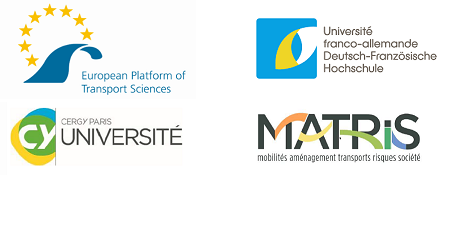|
|
|
Call of papers23rd European Transport Congress 2025 CY Cergy Paris University - Cergy-Pontoise – France
Thursday June 26 - Friday June 27, 2025 “Future of European transport: infrastructure, service and technologies”
Transport is a universal movement that links spaces to one another and builds bridges between people, their works and the nature that surrounds them. In an increasingly complex and risky world, which faces so many challenges, not only climatic, the power of movement provided by transport and mobility makes it an essential tool in the service of peace: transport connects people and nations, enabling mutual learning and understanding of each other's cultures and lifestyles. At the same time, transport has an impact on the environment: infrastructures profoundly and sometimes irrevocably alter the landscape. Noise, accidents - particularly on the roads - and air pollution all have a negative impact on our quality of life, especially in cities. CO2 emissions are rising steadily in this sector, altering the climate and heating up the atmosphere. Facing these challenges, the European transport sector is still experiencing unprecedented growth across all modes which are exacerbating this nuisance. Underpinned by strong demand for commuters, business and leisure mobility, most modes of passenger transport - road, rail, air and public transport - have in 2024 returned to and surpassed their pre-crisis COVID traffic levels. What remains unique is that, despite strong national and European budgetary incentives, the proportions of the different modes remain remarkably stable over time, especially in passenger transport. In freight transport, Rail is gaining ground in the modal shift from road to rail, to the detriment of river transport. This could be the result of the competitive new framework of the European transport policy implemented in rail. The European Union is spearheading efforts to address the harmful effects of the transport sector, aiming for carbon neutrality and boosting the competitiveness of the European economy, where companies are facing increasingly fierce competitive forces in the world. Re-elected to the head the European Commission in 2024, Ursula von der Leyen has announced that she will maintain the Green Deal as a priority. But this E.U.'s Green Deal and decarbonization policies in Europe, which are essential as the transport sector is still increasing its CO2 emission, are finding it difficult to gain the political and social acceptance among a large share of citizens. Growing inequalities can also be observed in mobility, particularly for countries that are slow to implement competition in rail transport. The European Parliament is expressing doubt to keep the heading: in November 2024, the European Parliament postpones and further relaxes the law for combating the deforestation. The challenges, which is facing the transport sector in Europe, remain crucial for the future: the war in Ukraine has reshuffled the energy cards for several member states, led to budgetary readjustments that are less favorable to transport policy, and changed the optimism of many countries, particularly in Central Europe, in the development of new markets. Artificial intelligence advances could profoundly alter the structure of jobs in the transport sector, which on the other hand is experiencing a severe shortage of drivers and logistics agents. But innovation remains the driving force behind the transport sector, both in terms of the technologies implemented – source of energy and very active battery research linked with the electrification of the fleet, rolling stock materials, low carbon footprint mobility equipment - and services (MaaS, biking strategies, seamless transport measures, etc.). Added to this is renewed urban planning ideas around multimodal interchange hubs, which are opening up new horizons for a calmer and attractive city in terms of mobility and living style. We therefore invite you to present the results of your research in the 23rd European Transport Congress on June 26 and 27, 2025 by CY Cergy Paris Université, 33 bd du Port, 95011 Cergy-Pontoise cedex, France.
We will organize the presentation of selected papers around the following 4 sessions:
A – Recent developments related to sustainable mobility in both metropolitan and rural areas B – The role of rail transport and its financial sustainability in the competitive framework of the European Union transport policy with regard to both passengers and freight mobility C – Themes linked to the economic, financial and operational challenges of urban mobility in Europe D – Themes related to links between transport planning, urbanism and mobility policies E - Posters session
On Saturday June, 28th, we plan technical visits [to be announced later]
Submission deadline of the abstract (around 1000 words) : 31th January 2025 Acceptation: 31th March 2025 Submission of full paper: 1st June 2025 – link with European Transport Studies for submitting articles |


